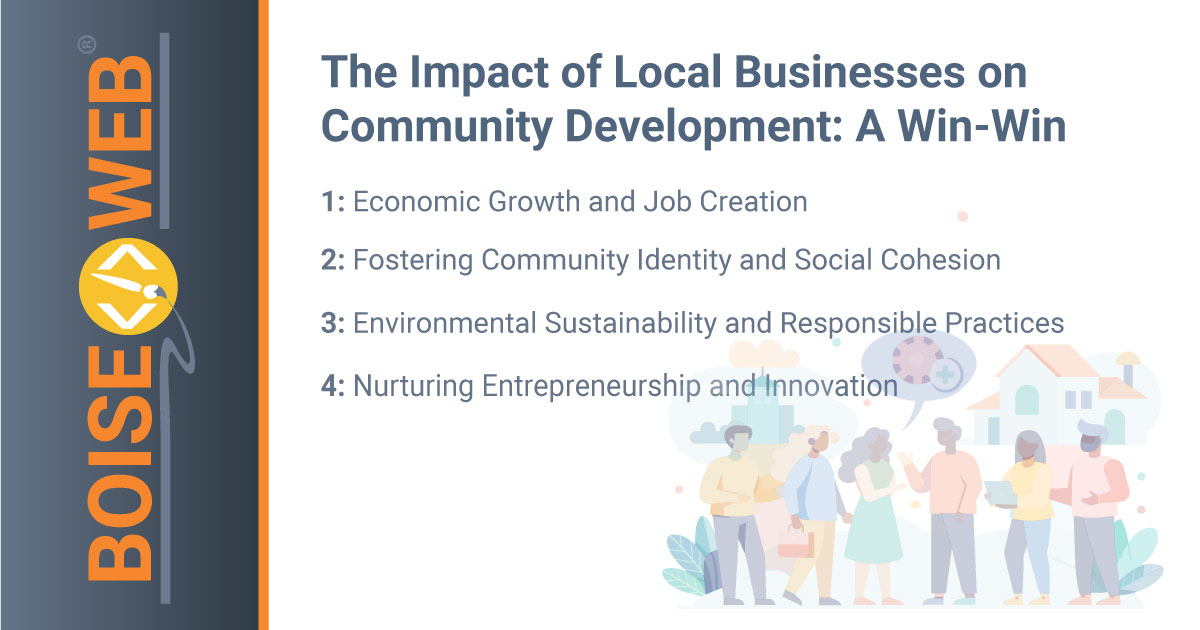Local businesses are the lifeblood of communities, playing a significant role in shaping the economic, social, and cultural fabric of neighborhoods and towns. Their impact extends far beyond mere commerce, as they often serve as community hubs, sources of employment, and drivers of local development. In this article, we delve into the multifaceted influence of local businesses on community development, exploring how their success can lead to a mutually beneficial relationship, creating a win-win scenario for both businesses and the communities they serve.
Economic Growth and Job Creation:
Local businesses are essential contributors to economic growth at the community level. Unlike large corporations that may have headquarters elsewhere, local businesses reinvest a substantial portion of their earnings back into the community. This reinvestment stimulates economic activity, creates jobs, and fosters entrepreneurship.
Job Creation: Local businesses are significant employers, providing job opportunities for residents within the community. From entry-level positions to skilled trades, local businesses offer diverse employment opportunities, reducing unemployment rates and boosting household income.
Economic Multiplier Effect: When consumers spend money at local businesses, a significant portion of that money circulates within the community. This phenomenon, known as the economic multiplier effect, occurs as local businesses purchase goods and services from other local suppliers, creating a ripple effect that amplifies the initial economic impact.
Fostering Community Identity and Social Cohesion:
Local businesses play a pivotal role in shaping the unique identity and character of a community. They often reflect the culture, values, and aspirations of the residents, contributing to a sense of belonging and pride. Moreover, local businesses serve as gathering places where community members can connect, fostering social interactions and strengthening social cohesion.
Community Spaces: Local businesses such as cafes, bookstores, and galleries serve as informal gathering spots where residents can engage in meaningful conversations, exchange ideas, and build relationships. These spaces contribute to the social vitality of the community, enriching the quality of life for residents.
Support for Community Initiatives: Local businesses are frequently involved in supporting local initiatives, events, and causes. Whether through sponsorships, donations, or volunteerism, businesses demonstrate their commitment to the well-being of the community, fostering a sense of solidarity and collective responsibility.
Environmental Sustainability and Responsible Practices:
In an era of growing environmental awareness, local businesses have an opportunity to lead by example in promoting sustainability and adopting responsible business practices. By prioritizing eco-friendly initiatives, such as waste reduction, energy efficiency, and sourcing from local suppliers, businesses can minimize their environmental footprint and contribute to a healthier, more sustainable community.
Sustainable Practices: Many local businesses prioritize sustainability in their operations, implementing practices such as recycling, composting, and reducing single-use plastics. These initiatives not only benefit the environment but also resonate with environmentally conscious consumers, enhancing the reputation and competitiveness of the business.
Support for Local Suppliers: Local businesses often prioritize sourcing goods and services from other local suppliers, reducing the carbon footprint associated with transportation and supporting regional economies. By fostering partnerships with local farmers, artisans, and manufacturers, businesses contribute to the resilience and vibrancy of the local supply chain.
Nurturing Entrepreneurship and Innovation:
Local businesses serve as incubators for entrepreneurship and innovation, providing aspiring entrepreneurs with opportunities to pursue their dreams and transform ideas into reality. By offering mentorship, networking opportunities, and access to resources, established local businesses can play a pivotal role in nurturing the next generation of entrepreneurs, driving economic dynamism and creativity within the community.
Mentorship and Collaboration: Established local businesses can mentor aspiring entrepreneurs, sharing insights, experiences, and best practices to help them navigate the complexities of starting and growing a business. By fostering a culture of collaboration and knowledge sharing, businesses contribute to the success and resilience of the local entrepreneurial ecosystem.
Innovation Hubs: Local businesses often serve as innovation hubs, where entrepreneurs and innovators can experiment with new ideas, products, and services. Whether through coworking spaces, maker labs, or incubator programs, businesses provide a fertile ground for creativity and experimentation, driving economic diversification and competitiveness.
Local businesses are integral to the social, economic, and cultural vitality of communities, playing a central role in driving community development and fostering a sense of belonging and pride among residents. By embracing a win-win approach that prioritizes economic growth, social cohesion, environmental sustainability, and entrepreneurship, local businesses can create lasting positive impacts that benefit both businesses and the communities they serve. As pillars of community development, local businesses embody the spirit of collaboration, resilience, and innovation, shaping a brighter future for generations to come.







